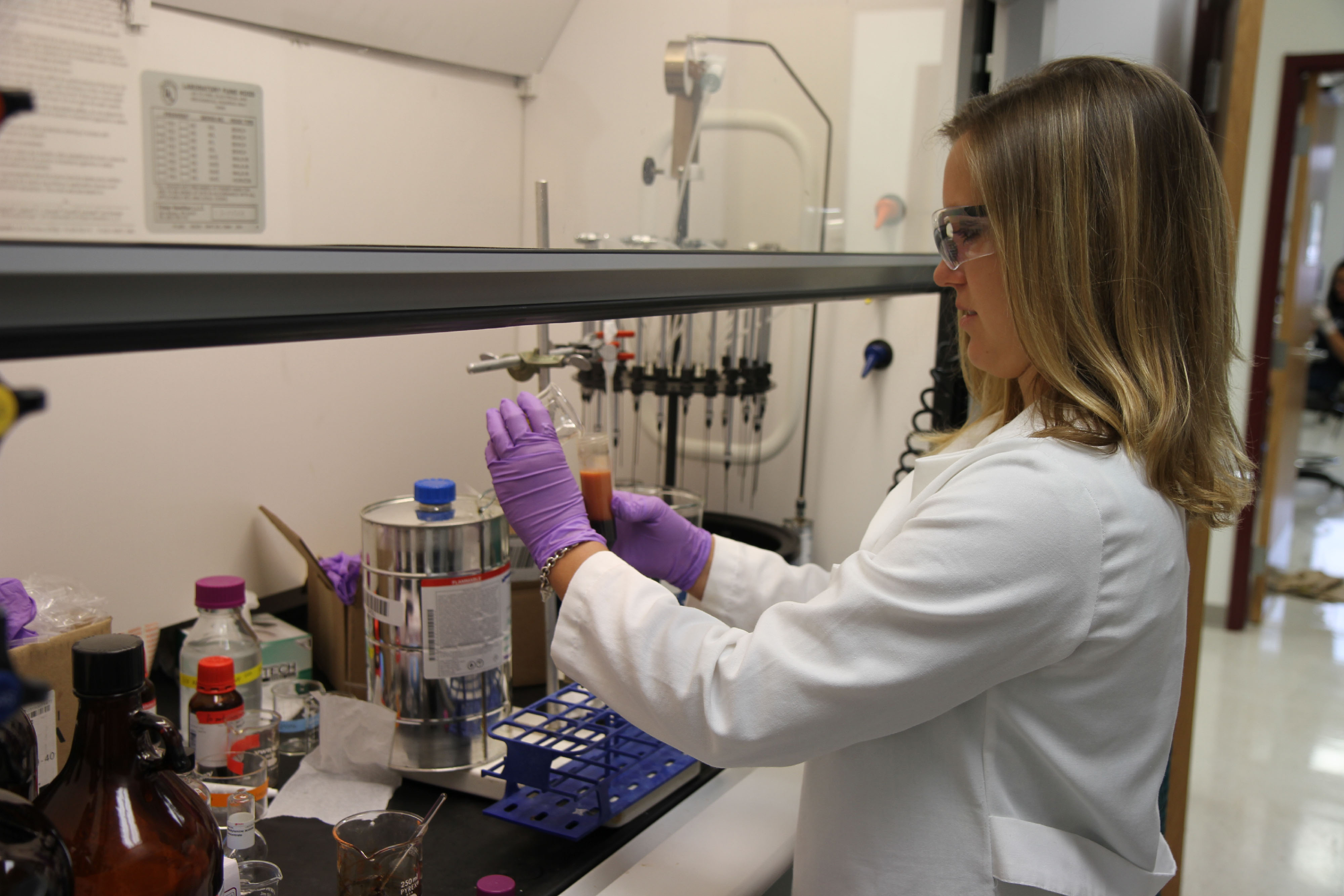Undergraduate researcher examines ways to prevent obesity and reverse effects of metabolic syndrome

During an age when many companies would like to promote the health-protective activities of foods and supplements, Virginia Tech scientists are conducting research to investigate the ways in which chocolate and grape seed extract can reduce the onset and severity of metabolic syndrome and its associated diseases (obesity, type-2 diabetes, etc.).
Laura Griffin of Leesburg Va., a junior double-majoring in human nutrition, foods, and exercise and food science, is working with Andrew Neilson, an assistant professor in the department of food science and technology, as part of the Fralin Life Science Institute’s Summer Undergraduate Research Fellowship program.
Neilson and Griffin are conducting experiments in which mice on high fat diets are also given various doses of grape seed extract. Grape seed -- as well as chocolate, apples, berries, and other foods -- contain naturally occurring compounds known as procyanidins. These compounds have been found to reduce the incidence and severity of obesity and type-2 diabetes in animals. However, the exact process by which grape seed extract exerts this effect remains unknown.
Neilson’s hypothesis is that the compounds in grape seed improve the integrity and function of the gut barrier, which is often compromised in obese individuals or individuals with metabolic syndrome. Obesity and metabolic syndrome are known to impair the ability of the gut wall to keep bacterial endotoxins from entering the bloodstream, which is then thought to cause inflammation and insulin resistance in muscle. Neilson and Matthew Hulver, associate professor in human nutrition, foods, and exercise, have developed preliminary data suggesting that grape seed indeed improves the integrity of the gut barrier. Griffin’s project this summer has been to assist on a larger study to definitively show that grape seed inhibits metabolic syndrome by improving gut barrier function.
In a separate but related project, Griffin and Neilson are fractioning the grape seed extract into smaller groups of compounds in order to have a better understanding of which compounds or combination of compounds are working to increase intestinal wall integrity and combat the inflammation that contributes to obesity.
“The hope is that grape seed will help reduce endotoxin levels and inflammation, thus preventing obesity,” said Griffin.
Griffin is also developing methods to prepare cocoa extracts, which may be used in the future to test the effects of cocoa in high fat diets in animal models.
After graduation, Griffin hopes to pursue a master’s degree in food science and, ultimately, work in the health food industry. Along with participating in the SURF program this summer she is also a fitness instructor and competitive Latin style ballroom dancer.
“My whole life has been about having a healthy lifestyle," said Griffin, “and since I have always been passionate about eating well, I would like to help make healthier food options available to people.”
The SURF program has opened the door for Griffin to pursue her passion for research.
"It’s an excellent program, and I enjoy working in the lab," she stated. "In previous experiences, I would only be in the lab a couple hours a week, now I’m there all day; I accomplish many more tasks, and I love that every day is different. The environment is much more fluid, it’s easier to pick up where I left off, and SURF has given me that opportunity."
Neilson states, "Laura's experience in the SURF program is invaluable in preparing her for success in her future graduate studies. Previous lab experience is a huge advantage for undergraduates, as many faculty have noticed that incoming graduate students without lab experience tend to struggle in the lab. In some cases, new graduate students discover that they actually do not enjoy lab work, which can severely hinder their progress toward graduation. The SURF experience will increase the likelihood that these students are accepted into a good graduate program and that they succeed in that program.”
During the summer of 2012, the Fralin Life Science Institute Summer Undergraduate Research Fellowship (SURF) program and the Division of Undergraduate Education's Scieneering program have banded together to offer an unprecedented number of students — 82 — paid research fellowships. Research appointments, outreach, and group activities are coordinated by Tomalei Vess, director of undergraduate research, and Keri Swaby, Scieneering program manager. For more information, visit the Fralin Life Science SURF website and Scieneering program website.
Written by Cecilia Elpi, communications assistant at the Fralin Life Science Institute.




